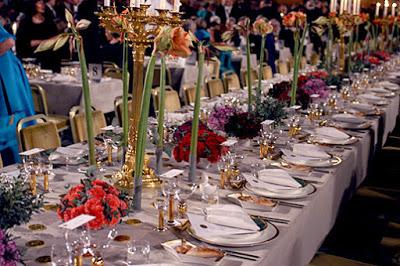 In a few minutes time, we will be invited to come to communion.
In a few minutes time, we will be invited to come to communion. At one level, it is not much of an invitation: you’re invited to receive a wafer and a sip of wine. At another level this is the greatest invitation that you will ever receive: It is the invitation to participate in the Kingdom of Heaven, to live the life of God. It is the invitation to participate in the King’s wedding banquet for his son.
Of course, what happens here is just the hors d’oevre, the zakuski, the taster of the wedding banquet in heaven, but it is still part of that banquet.
And the parable that Jesus tells is
1. About a great invitation
An invitation to participate in God’s Kingdom. It is amazing invitation. It is a wedding feast: about new beginnings, love and joy and hope and deep intimacy. It is an invitation to start again; to know the deep love that God has for you; to receive the joy that he would give you - even in the face of the most awful circumstances; and it is an invitation to intimacy: deep spiritual intimacy with God and with his people.
And look at the abundance of this banquet: there are oxen and fatted calves. This is the best. The prophet Isaiah speaks of the coming Kingdom: a place of abundance and prosperity; where generations will be at ease with each other; where there will be no war, famine, disease, sickness or death; where children will play safely with snakes and wolves and lambs will lie down together.
And of course, the Kingdom in its fullness is future. But we have the taster of this future Kingdom here and now: we have the Holy Spirit and the presence of God with us and in us; we have the Bible, God’s word, which speaks of his good and wise law and ways; it declares his sure and certain promises; and we have the church, and the sacraments; we have each other and fellowship; a purpose for living and a hope that reaches beyond death.
Jesus in this parable is of course speaking to the people of his day. When he tells this story he has in mind God’s invitation to the people of his time. There had been the prophets. And then there was John the Baptist, the great messenger: ‘Repent for the Kingdom of Heaven is near’. In other words, John was saying, ‘It is time. The banquet promised 3000 years earlier is ready’. A few had heard and responded. But the majority had either completely ignored the prophets and John and some had had them put to death.
And now, because they refused to come, the invitation comes to us, the people who live on the streets. People who never thought that we would be invited, who could not conceive that the love of God could extend even to me. There is nothing special about us, nothing remarkable. Unless you happen to be Jewish by racial descent, none of us belong to a privileged special race. There is nothing particularly good about us.
But it is the invitation to come to God’s wedding banquet, to become part of the Kingdom of God, to share in the very life of God.
It is a great invitation.
2. About the foolishness of saying no.
Richard, a former member of our church in Bury, has a son called Steve. Steve has just graduated from university with a good degree in IT, is looking for work, and would love to work creating online games. Richard does some work for a man who owns a major IT gaming company. He was talking with him about his son, when Steve turned up. The owner of the IT company turned to Steve and said, ‘Can you come and see me this evening’. And Steve said, ‘I’m sorry I can’t; I’m going out tonight’. Well, you can imagine the conversation between father and son a little bit later that evening. May I give you some advice: When you are looking for an IT job and the owner of an IT company offers to meet you, you do not say No! I don’t think that Steve will make the same mistake again. It was very foolish to say no.
And the people here were foolish to say no.
There are of course different ways of rejecting this invitation.There is open blatant rejection. The messengers are persecuted, seized, imprisoned and executed. That happened to believers in this country, many of whom are celebrated as the new martyrs. And it is still happening. On Thursday Fr Samaan Shehata, a Coptic Orthodox priest, was stabbed to death in Cairo.
But it is a foolish thing to do. To openly reject the King.
Jesus speaks on several occasions declaring that we will be judged on how we have treated those who have come in his name. It works both ways. Those who reject them will be rejected. Those who receive them will be received. If you even give one of my followers a glass of water because they come in my name, says Jesus, you will be rewarded.
But you do not need to abuse the messenger to reject the message. You can simply ignore it. To treat it "lightly". To live life as if God does not exist.Because what the people here are saying. “OK. Thanks for letting us know. God’s throwing a party. But it is not important. What is important is my farm, my business.”
That is us: religion, god stuff is OK so long as it is in its right place. It belongs to the entertainment side of life. It is the smetana that you add into the soup, to make the soup just a little bit better. And if you don’t have it, well it’s a shame, but it’s your choice. But running the farm, keeping the company afloat – that is the important stuff of life.
No wonder the king is furious. He destroys the murderers and wipes out their city.
Now this is a story, but in telling the story Jesus is warning us that God cannot be side-lined and his invitation cannot be ignored. We’re talking God here! He cannot be put in the drawer marked entertainment and leisure. He cannot be treated as an optional extra to life – something that is there for our spare time. He is the one who created us, who gives us life and skills, who gives us business. He is the one to whom each one of us is accountable. He offers us an amazing invitation, and it is foolishness to say No.
3. About grace
There are different ways to understand verses 11-13, and the wedding robe. Some say that it is the robe of good deeds. I don’t think that is the case because we are told specifically that the people who came in were both good and bad (v10). Maybe (and this is how I understand this), as the guests came in off the street, they were all offered wedding robes to cover their old clothes. And the man here had refused the gift of the wedding garment. Or maybe he thought that he was OK in his own clothes. He was wearing the latest designer label jacket, he was wearing his best clothes
Perhaps that is why, when the king asks him why he is not wearing a wedding robe, he is speechless. ‘But I thought’, he stammers, ‘that my best was good enough’.
The invitation that we have to become part of the Kingdom of God, to share in the life of God, to even come to communion is an invitation of grace. It does not depend on us, on who we are or what we have done.
Perhaps some of us who are here today have heard the invitation but we are still wearing our old clothes. We think that they are good enough. And so we think that we deserve to be here: we are important enough, or good enough, or repentant or confessed enough, or we’ve given enough to the church or worked hard enough for the church, we’ve mortified ourselves enough or we are religious enough to come forward.
We think that God owes us this.
If that is the case, then please do not come. Because the consequences of coming when we are metaphorically dressed in our own clothes, even our best own clothes, are pretty horrific.
This meal is for sinners. It is for people who know that their old clothes are inadequate. It is a meal for people who are good, but who know that they are no way good enough. It is a meal for people who are bad, but who are seeking God’s mercy. It is a meal for those who know that their best will never be good enough for God. It is a meal for all who are willing to receive forgiveness, the strength to live a new life, and who are desperate for Jesus to be part of their life.
I love this. When we come to the banquet, ready to cast off our old clothes, God will throw over us a wedding robe. Round the corner from where we lived in London there was an African Church, I think they called themselves the Church of Christ. They would all turn up on Sunday afternoon wearing long white robes – not just the minister. It was this passage lived out. It reminds me of the story of the prodigal son who returns home, and is about to reel off his grovel speech, telling his father why he is so unworthy, when his father stops him, embraces him and places on him a robe – the robe that declares that he is his forgiven son, the robe that told him that he was welcome, that this was where he belonged, not as a servant or a welcome guest but as child and heir.
And when we receive the invitation and come, we too are offered robes. They are invisible. But they are robes of grace. Each one of us. They are offered to many, but few receive them. Nobody can say that their robe is more beautiful or more precious than the next person’s, for the robe that you are offered is priceless and unique to you. It is the robe of the Kingdom of Heaven; it is the robe that covers over our nakedness and filth, our good and our bad, our achievements and our failures; it is the robe which declares that you are accepted, forgiven, that you belong to God, that you are a son or a daughter of God, and that you belong here.
So my brothers and sisters, We have a remarkable invitation. You are welcome into the Kingdom of Heaven, you are welcome to the Kings wedding banquet, you are welcome to this communion.Please do not be foolish and say no. And when you come, know that you come by grace. Come as a sinner, who knows that your best will never be good enough; come as a woman man who knows that you need God.
And if you come that way, allowing Grace to dress you with her robe, you are welcome to this table – it really is the Lord’s table - to this feast, and to that great feast.

